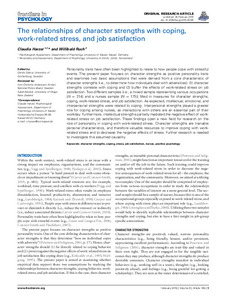Aufsatz
Artikel (Publikationen im Open Access gefördert durch die UB)

The relationships of character strengths with coping, work-related stress, and job satisfaction
Zusammenfassung
Personality traits have often been highlighted to relate to how people cope with stressful events. The present paper focuses on character strengths as positive personality traits and examines two basic assumptions that were derived from a core characteristic of character strengths (i.e., to determine how individuals deal with adversities): (1) character strengths correlate with coping and (2) buffer the effects of work-related stress on job satisfaction. Two different samples (i.e., a mixed sample representing various occupations [N = 214] and a nurses sample [N = 175]) filled in measures for character strengths, coping, work-related stress, and job satisfaction. As expected, intellectual, emotional, and interpersonal strengths were related to coping. Interpersonal strengths played a greater role for coping among nurses, as interactions with others are an essential part of their workday. Furthermore, intellectual strengths partially mediated the negative effect of work-related stress on job satisfaction. These findings open a new field for research on the role of personality in coping with work-related stress. Character strengths are trainable personal characteristics, and therefore valuable resources to improve coping with work-related stress and to decrease the negative effects of stress. Further research is needed to investigate this assumed causality.
Zitierform
In: Frontiers in psychology. - Lausanne : Frontiers Research Foundation, 2015, Vol. 6 : 165, 1-12Förderhinweis
Gefördert durch den Publikationsfonds der Universität KasselSammlung(en)
Publikationen (Psychologische Diagnostik)Artikel (Publikationen im Open Access gefördert durch die UB)
Zitieren
@article{urn:nbn:de:hebis:34-2015031347695,
author={Harzer, Claudia and Ruch, Willibald},
title={The relationships of character strengths with coping, work-related stress, and job satisfaction},
year={2015}
}
0500 Oax 0501 Text $btxt$2rdacontent 0502 Computermedien $bc$2rdacarrier 1100 2015$n2015 1500 1/eng 2050 ##0##urn:nbn:de:hebis:34-2015031347695 3000 Harzer, Claudia 3010 Ruch, Willibald 4000 The relationships of character strengths with coping, work-related stress, and job satisfaction / Harzer, Claudia 4030 4060 Online-Ressource 4085 ##0##=u http://nbn-resolving.de/urn:nbn:de:hebis:34-2015031347695=x R 4204 \$dAufsatz 4170 7136 ##0##urn:nbn:de:hebis:34-2015031347695
<resource xsi:schemaLocation="http://datacite.org/schema/kernel-2.2 http://schema.datacite.org/meta/kernel-2.2/metadata.xsd"> 2015-03-13T12:56:16Z 2015-03-13T12:56:16Z 2015 1664-1078 urn:nbn:de:hebis:34-2015031347695 http://hdl.handle.net/123456789/2015031347695 Gefördert durch den Publikationsfonds der Universität Kassel eng Urheberrechtlich geschützt https://rightsstatements.org/page/InC/1.0/ 150 The relationships of character strengths with coping, work-related stress, and job satisfaction Aufsatz Personality traits have often been highlighted to relate to how people cope with stressful events. The present paper focuses on character strengths as positive personality traits and examines two basic assumptions that were derived from a core characteristic of character strengths (i.e., to determine how individuals deal with adversities): (1) character strengths correlate with coping and (2) buffer the effects of work-related stress on job satisfaction. Two different samples (i.e., a mixed sample representing various occupations [N = 214] and a nurses sample [N = 175]) filled in measures for character strengths, coping, work-related stress, and job satisfaction. As expected, intellectual, emotional, and interpersonal strengths were related to coping. Interpersonal strengths played a greater role for coping among nurses, as interactions with others are an essential part of their workday. Furthermore, intellectual strengths partially mediated the negative effect of work-related stress on job satisfaction. These findings open a new field for research on the role of personality in coping with work-related stress. Character strengths are trainable personal characteristics, and therefore valuable resources to improve coping with work-related stress and to decrease the negative effects of stress. Further research is needed to investigate this assumed causality. open access In: Frontiers in psychology. - Lausanne : Frontiers Research Foundation, 2015, Vol. 6 : 165, 1-12 Harzer, Claudia Ruch, Willibald doi:10.3389/fpsyg.2015.00165 </resource>
Die folgenden Lizenzbestimmungen sind mit dieser Ressource verbunden:
Urheberrechtlich geschützt

